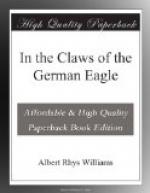Commissioned thus and desiring to live up to the code and requirement of the office, I naturally opined that war-correspondents rushed immediately into the thick of the fight. Later I discovered what a mistake that was. Only very young and green ones do so. The seasoned correspondent is inclined to view the whole affair more dispassionately and with a larger perspective. But being of the verdant variety, I naturally figured that if the Germans were smashing down through Belgium onto Liege that that was where I should be. By entering gingerly through the back door of Holland, I planned to join them in their march down the Meuse River.
To The Hague came descriptions of the hordes pressing down out of the north through the fire-swept, blood-drenched plain of northern Belgium. This could be seen from the Dutch frontier at Maastricht. But passage thereto was interdicted by the military authorities. Ambassador Van Dyke’s efforts were unavailing. Possessing a red-card, I enlisted the help of Troelstra, the socialist leader of the Netherlands.
He had just returned from an audience with the Queen. The government, seeking to rally all classes to face a grave crisis, was paying court to the labor leaders. Accordingly, the war department, at Troelstra’s behest, received me with a handsome show of deference. I was escorted from one gold-laced officer to another. Each one smiled kindly, listened attentively and regretted exceedingly that the granting of the desired permission lay outside his own particular jurisdiction. They were polite, ingratiating, obsequious even, but quite unanimous. At the end I came out by the same door wherein I went—minus a permission.
Up till now my progress through the fringes of the war zone had been in defiance of all orders and advice. Having failed here officially, I took the matter in my own hands. Finding a seat in a military train, I stuck steadfastly by it so long as our general direction was south. At Eindhoven hunger compelled me to alight. As I was stepping up to the hotel-bar, I felt a tap on my shoulder and some one in excellent English said:
“You are under suspicion, sir. Follow me. Don’t look around. Don’t get excited. If you are all right you don’t need to get excited; if you aren’t it won’t do you any good to get excited.”
With this running fire of comment he led me into a side-room where a half-hour’s examination satisfied him of my good intent. Without further untoward incident I came to Maastricht in Limbourg. Limbourg is the name of the narrow strip of Dutch territory which runs down between Germany and Belgium. At one place this tongue of land is but a few miles wide. If the Germans could have marched their troops directly across this they might have been spared the two weeks’ slaughter at the forts of Liege and Paris, in all probability, would have fallen before them. It was a great temptation to the Germans. That’s the reason the Dutch troops had been massed here by the tens of thousands—to prevent Germany succumbing to that temptation.




